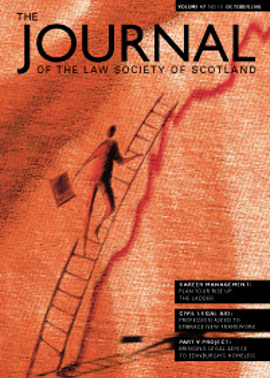Bringing legal advice to the socially excluded
For Streetwork solicitor Norman Mackay his non-traditional office is the places where the capital’s vulnerable groups such as rough sleepers and young people at risk congregate.
Streetwork is a charity that works with some of the most socially excluded people in the community and one night a week Norman Mackay accompanies other street workers to provide legal advice.
The initiative to have a solicitor on hand to offer legal advice to Edinburgh’s socially excluded is one of four Part V pilot projects across the country funded by the Scottish Legal Aid Board designed to address unmet legal need.
So what brings someone into this line of work? In Norman Mackay’s case it’s the extension of a commitment to working on a voluntary basis with youths in deprived areas – except this time in a salaried post putting his legal training to use.
Seven days a week Streetwork have people on three-hour shifts and speaking to vulnerable people on the streets and seeing what help they need.
“Support workers will provide them with advice on issues such as benefits and housing and offer emotional support as well as getting them involved with other agencies who can help them find accommodation.
“My role within the organisation is to deliver the Legal Aid Board’s objective of making legal advice more readily available to Streetwork clients.”
Typically the people he deals with have had some contact with solicitors in the past and for whatever reason have been unable to keep that up.
“A big factor is just getting them to make an appointment with a solicitor and keep that. At an early stage we realised that in order to make my service more accessible it was essential that I go out on one of the Streetwork shifts rather than just waiting for clients to drop into the office.
“I don’t particularly advertise myself as a lawyer when out on shifts, but if any legal problems arise during the course of conversations I can offer advice and contribute to the team.
“A lot of the people who come to the office will be looking to get temporary or permanent accommodation provided by the council and often it will be a case of advocating on their behalf, arguing they are a priority need and not intentionally homeless. Many of them will have rent arrears problems.”
In the six months since the project commenced he has set up drop in clinics at some of the night centres open for the homeless and sees clients referred from other support agencies, housing officers and hostels.
Casework represents a significant part of his role, the other element is providing training to partner agencies.
“Over the course of the project we will monitor cases, see what sort of issues are coming up and then hope to collate all that information and attempt to influence policy in the longer term.”
One example of a case where Norman Mackay has been able to offer valuable assistance involved a client in his 50s who had previously run a building contract business. The sub contractor had reneged on the deal, his company had collapsed and after paying his employees he was unable to meet his tax bill. Ever since he had been wary of claiming benefits, living on the streets and doing occasional jobs.
“It was a case of talking him through the worst case scenario, explaining that it was a civil debt and unless he had evaded or misrepresented his situation he wouldn’t be liable to be subject to criminal proceedings.
“The homeless scene is very different from how it was a few years ago and he finds it difficult to cope now.”
Many of Mackay’s clients have a general mistrust of authority, and numbered amongst that group would be solicitors.
“Solicitors are perceived as being part of the system and this project is trying to break down that mistrust.”
Critical to that process has been shedding the collar and tie.
“People can be surprised that they’re not coming to see someone in a pin striped suit, but generally it helps clients relax and talk to me.”
For Streetwork, Mackay’s presence has been a significant step in improving their service to Edinburgh’s vulnerable groups. Spokesperson Katie Owen said: “The fact that a solicitor is working in this environment rather than from an office, and in casual clothes rather than a suit, makes a huge difference to people who have a fear or dislike of people in authoritative positions or who find formal settings difficult. It brings down a barrier allowing more constructive relationships between solicitor and clients to take place. We are hoping that this pilot project can be replicated throughout the country to ensure access to civil legal assistance to all vulnerable members of society.”
Chairman of the Scottish Legal Aid Board Jean Couper said: “The aim of this and the other Part V projects is to make legal advice more accessible by adapting to non-traditional legal settings and delivering services in new and different ways. The projects are providing innovative and much wanted services to the communities they serve, while giving the Board and others a unique insight into different ways of providing legal advice. The information gained will be invaluable in the development of community legal services in Scotland, building upon the strengths and variety of present provisions, through new partnerships, new initiatives and new services.”
In this issue
- Scottish Solicitors’ Discipline Tribunal
- Opinion
- Dispelling myths of civil legal aid reform
- How healthy is your career?
- Hidden traps, new liabilities
- A lack of diligence
- Discerning changes in sentencing trends
- Initiatives to improve customer service
- Bringing legal advice to the socially excluded
- Keeping children safe on the internet
- Website reviews
- Technology to the rescue?
- In practice
- Plain speaking
- Book reviews






